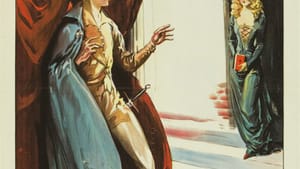Stay in the Loop
BSR publishes on a weekly schedule, with an email newsletter every Wednesday and Thursday morning. There’s no paywall, and subscribing is always free.
Fresh eyes on 'Faust'
Not So Silent Cinema and the Bismuth Quartet present Murnau’s ‘Faust’

In late February, Not So Silent Cinema landed at the Mütter Museum for a chance to reexamine F. W. Murnau’s 1926 Faust with fresh eyes and a wholly original score, composed by Bismuth Quartet members and Brendan Cooney, and performed live by the quartet.
The film’s stakes are high: a wager between an archangel and the devil. If a good man’s soul can be turned evil, then the world shall belong to the devil Mephisto. But how does this early 20th-century artifact, whose finely manipulated textures and perspectives and knife’s-edge morality, project itself into the present day?
Fantastic performers
The new soundtrack incorporates piano, strings, drum, and synthesizer, and is a delight for three-quarters of the movie’s approximately 90-minute runtime. In parts, it dramatically highlights or further transfigures Murnau’s stunning visual effects, sucking the audience deeper into its disturbing narrative.
The Bismuth Quartet members are becoming darlings of Philadelphia’s new music scene: their ability to improvise, switch styles, and compose leaves me incredibly impressed. They don’t have just one beautiful sound, but many: their sensitivity to timbre and the resonance of the room gives tremendous depth to their playing, from abrasive metallic to sumptuous sweet.
Deeply moving music
Their classic, glittering sound allows the use of synthesizer to contrast and properly characterize Mephisto’s actions. This bit of electronics simultaneously gives the onscreen action a multi-valent feel, combining modernity, vaporwave, contemporary scoring practices, and gritty ‘80s synth styling.
At the Mütter performance, the power of the new score combined with the film’s imagery in deeply moving ways. The scenes where the plague, death, and hedonism take over the town become deadly serious, instead of a piece of overwrought acting. The pounding of the drums, complemented with astonishing legato dissonances, unified the past and present. Other standout scenes included Gretchen nearly freezing to death, and the book-burning scene.
Setting the wrong tone
Unfortunately, there was also a glaringly oppressive and disheartening part of this experience. The entire third act of the film centers on a scene of sexual coercion and its victim-blaming aftermath.
This, while certainly an artifact of its time, is depressing enough. But seeing the character of Gretchen physically overpowered and tricked into sex by Mephisto’s supernatural means became even more disturbing when these scenes got a lush romantic score, insinuating that this activity is consensual. Resolving chords met unwilling kisses. Faust is preventing Gretchen from leaving his presence by restraining and pulling at her on multiple occasions, but the music never emphasized this.
One of the worst moments is watching Faust’s hand strain to push open a window, while Gretchen at the other side is trying to force it closed, her face between the windowpanes reflecting horror. But the score implies she’s just playing hard to get. The Not So Silent Cinema audience followed the score’s lead, laughing at moments where Mephisto is attempting to force Gretchen into sex with mind control, and when other characters call her a "harlot" and "whore."
An uneven score
I felt so alone, so full of despair at that laughter, I wanted to shrink and cry. Did the audience comprehend what was going on, and somehow think Gretchen deserved it? Would they laugh at and insult a survivor of sexual assault in real life? While I did enjoy the majority of my time at this screening, I would recommend a substantial rescoring of the third act. If I didn’t know better, I would think the devil won his wager—and that ain’t worth any price.
What, When, Where
Not So Silent Cinema presented F. W. Murnau’s Faust, with an original score by members of Bismuth Quartet and Brendan Cooley, performed live by Bismuth Quartet. February 27, 2020 at the Mütter Museum, 19 S. 22nd St, Philadelphia. notsosilentcinema.com or bismuthquartet.org.
The Mütter is wheelchair-accessible at its east entrance on Van Pelt Street (wheelchair-users can access an intercom speaker to the right of the glass door marked “College of Physicians of Philadelphia.”) Personal Care Assistants are always provided complimentary admission when accompanying a paying visitor to the museum. American Sign Language interpretation is available for any public program, with advance notice. Please contact Meredith Sellers ([email protected]) to request ASL interpretation with two weeks’ notice, or for any other accommodations.
Sign up for our newsletter
All of the week's new articles, all in one place. Sign up for the free weekly BSR newsletters, and don't miss a conversation.

 Aaron Pond
Aaron Pond